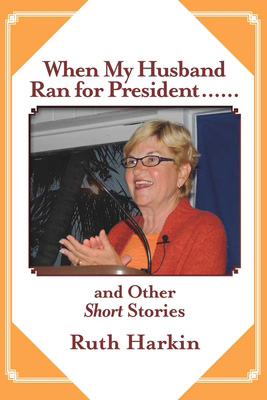
Around a month ago, I had the pleasure of covering Ruth Harkin’s book launch for The Times-Delphic. During that launch, Ruth Harkin read excerpts of her short story collection – titled “When My Husband Ran for President and Other Short Stories” – answered questions and signed copies of the book. Thanks to her excerpts, I grew intrigued and purchased a signed copy — something I, a used book purchaser till the end, hardly do.
Well, I am glad to say that I do not regret it. Ruth Harkin’s book is a treasure trove of inspiring and hilarious stories, from her decision to take a position running an army club in Korea (“Where the hell was Korea?” she asks herself after she accepts the position), her first time meeting her future husband (a shrine for long-lasting marriage, something the two didn’t realize until their 50th anniversary), her daughter’s middle-school basketball games (which she gets very passionate about) and more. Ruth Harkin has a special writer’s voice that bursts from every page, to the point where I felt like I was listening to stories from an old friend. She’s relatable, warm and open in these tales.
Ruth Harkin, the wife of presidential candidate and former Iowa senator Tom Harkin — the part-namesake of Drake’s Harkin Institute — is a pioneer in many ways. She was actually elected into office before her husband as county attorney of Story County, Iowa, and spent the rest of her career paving the way for other women, whether it was through hiring female interns, allowing women to work part-time or bringing her own baby to work (all decisions she describes in detail in one of the stories towards the end).
The problem with some memoirs is that their subjects don’t lead interesting enough lives to merit my reading hundreds of pages about them. Ruth Harkin combats this by having a series of short and complete tales rather than incomplete streams-of-thought. But, more importantly, not only was her life interesting, she herself is a fascinating person. She talks to strangers, makes spur-of-the-moment decisions, challenges hierarchies and tells the tales without a hint of regret.
To put it shortly, her personality makes her life interesting, which makes the book not just interesting but inspiring.
The book is also hilarious, but not from jokes. Most of the humor is purely situational, and Ruth Harkin knows it, highlighting the humorous details even in the more serious stories. For example, in the book’s namesake story, during her husband’s speeches, Ruth Harkin focuses on her daughters’ reactions to each, which range from boredom to wanting to ride horses.
But most fascinatingly, Ruth Harkin is a woman aware of the legacy she is leaving. She knows that she is a trailblazer, and while she speaks about that in the book, she spends more time focusing on the people around her, from her children to the events that haven’t already been discussed in the press. The book therefore ends up being more of an intimate piece than a “best of” moment compilation from a celebrity full of things the public already knows.
The book’s author’s proceeds are all going to the Harkin Institute as well, because she didn’t write this for profit — she wanted her daughters and granddaughters to read the stories she’d been writing for years.
I cannot recommend this book enough. Whether you know about Ruth Harkin’s life or not, whether you’re into politics or not, there’s a story in here for everyone, and you’ll smile as she tells it.







